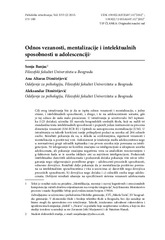Prikaz osnovnih podataka o dokumentu
Odnos vezanosti, mentalizacije i intelektualnih sposobnosti u adolescenciji
The relationship between attachment, mentalization, and intellectual abilities in adolescence
| dc.creator | Banjac, Sonja | |
| dc.creator | Altaras Dimitrijević, Ana | |
| dc.creator | Dimitrijević, Aleksandar | |
| dc.date.accessioned | 2021-10-12T11:49:24Z | |
| dc.date.available | 2021-10-12T11:49:24Z | |
| dc.date.issued | 2013 | |
| dc.identifier.issn | 0352-7379 | |
| dc.identifier.uri | http://reff.f.bg.ac.rs/handle/123456789/1692 | |
| dc.description.abstract | Cilj ovog istraživanja bio je da se ispita odnos vezanosti i mentalizacije, s jedne strane, i intelektualnih sposobnosti, s druge, i to na adolescentnom uzrastu, gde je taj odnos do sada malo proučavan. U istraživanju je učestvovalo 345 ispitanika (123 dečaka), učenika III razreda beogradskih srednjih škola, koji su radili tri standardna testa intelektualnih sposobnosti i popunili jedan instrument za procenu dimenzija vezanosti (SM-ECR-R) i Upitnik za samoprocenu mentalizacije (UM). U istraživanju su takođe korišćeni ranije prikupljeni podaci sa uzorka od 284 odrasle osobe. Rezultati pokazuju da su, u skladu sa očekivanjima, sigurnost vezanosti i mentalizacija u pozitivnoj vezi. Anksioznost je izraženija među adolescentima nego u normativnoj grupi odraslih ispitanika i na prvom uzorku nije povezana sa inteligencijom. Ni izbegavanje ne korelira značajno sa inteligencijom u ukupnom uzorku adolescenata, ali pokazuje značajnu negativnu vezu sa analoškim rezonovanjem i g-faktorom kada se iz uzorka isključe oni sa najvišom inteligencijom. Poduzorak intelektualno darovitih adolescenata i poduzorak dečaka pokazuju više nivoe izbegavanja nego odgovarajuće poredbene grupe - adolescenti prosečnih sposobnosti, odnosno devojčice. Rezultati dalje pokazuju da je mentalizacija pozitivno povezana sa intelektualnim sposobnostima i viša u uzorcima: a) darovitih nego devojčica prosečnih sposobnosti, b) devojčica nego dečaka i c) odraslih osoba nego adolescenata. Dobijeni rezultati ukazuju na specifičnosti sistema vezanosti adolescenata (u poređenju sa odraslim ispitanicima), otkrivaju važne veze između izbegavanja, mentalizacije i intelektualnih sposobnosti, pružaju uvid u relevantne polne razlike na planu vezanosti i mentalizacije i doprinose razumevanju socioafektivnih specifičnosti intelektualno darovitih učenika. | sr |
| dc.description.abstract | This paper explored the relationship between attachment, mentalization, and intelligence as it occurs in adolescence. Study participants were 345 students (123 males) in their third year of high school. Participants were administered three standard tests of intelligence, the SM-ECR-R, and the recently developed Mentalization Questionnaire (MQ). The study also utilized earlier collected data from a sample of 284 employed adults. In line with our research hypothesis, attachment security and mentalization were positively related, with correlations ranging from small to moderate depending on the dimension inspected. Attachment anxiety was found to be higher in the adolescent than in the adult sample, and contrary to expectations was not significantly related to intelligence in the former group. Attachment avoidance did not correlate with intelligence in the total student sample, but did show a small negative association with analogical reasoning and the g-factor when the intellectually gifted were excluded from analyses. This latter group, as well as males from the student sample scored significantly higher on attachment avoidance than their respective comparison groups - intellectually average and female adolescents. Finally, mentalization was found to be positively related to intellectual ability and higher in a) gifted than average-ability girls, b) girls than boys, and c) adults than adolescents. The results are discussed as shedding light on the peculiarities of the attachment system in adolescence, revealing specific associations between attachment avoidance, mentalization, and intellectual ability, highlighting gender differences in both attachment and mentalization, and adding to our understanding of the socioemotional characteristics of intellectually gifted students. | en |
| dc.publisher | Univerzitet u Beogradu - Filozofski fakultet - Institut za psihologiju, Beograd | |
| dc.relation | info:eu-repo/grantAgreement/MESTD/Basic Research (BR or ON)/179018/RS// | |
| dc.rights | openAccess | |
| dc.rights.uri | https://creativecommons.org/licenses/by-sa/4.0/ | |
| dc.source | Psihološka istraživanja | |
| dc.subject | vezanost | sr |
| dc.subject | mentalizacija | sr |
| dc.subject | intelektualne sposobnosti | sr |
| dc.subject | darovitost | sr |
| dc.subject | adolescenti | sr |
| dc.subject | mentalization | en |
| dc.subject | intelligence/intellectual abilities | en |
| dc.subject | intellectual giftedness | en |
| dc.subject | attachment | en |
| dc.subject | adolescents | en |
| dc.title | Odnos vezanosti, mentalizacije i intelektualnih sposobnosti u adolescenciji | sr |
| dc.title | The relationship between attachment, mentalization, and intellectual abilities in adolescence | en |
| dc.type | article | |
| dc.rights.license | BY-SA | |
| dc.citation.epage | 190 | |
| dc.citation.issue | 2 | |
| dc.citation.other | 16(2): 175-190 | |
| dc.citation.rank | M51 | |
| dc.citation.spage | 175 | |
| dc.citation.volume | 16 | |
| dc.identifier.doi | 10.5937/PsIstra1302175B | |
| dc.identifier.fulltext | http://reff.f.bg.ac.rs/bitstream/id/584/1689.pdf | |
| dc.type.version | publishedVersion |

